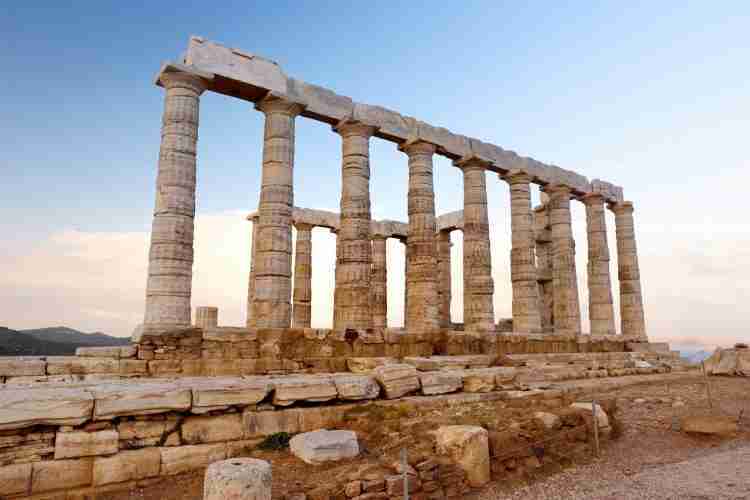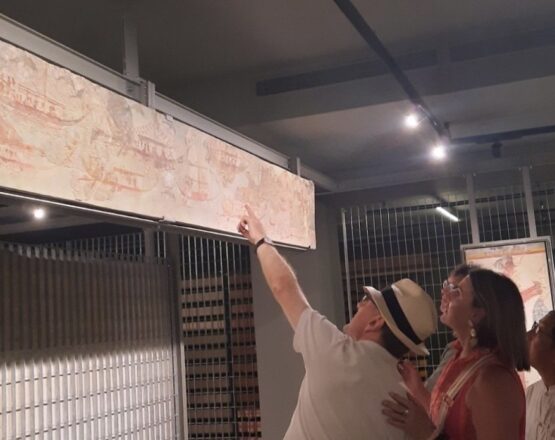Greek history in a nutshell

Some four thousand years ago, the pyramids in Egypt stand proud, and Babylon in Iraq is mistress of a huge empire: thing are large and impressive all over the Near East.
But not only there: out to the West, in the Mediterranean Sea lies the island of Crete, the largest of a myriad huddled together in the Cyclades. And there the locals, the Minoans as we call them, are putting up their first palaces. Within a couple of centuries, their impressive structures, some with 3 or more storeys, and exquisite art are the wonder of the Aegean.
You will likely have heard of the myths broadly associated with these times: the Labyrinth, the Minotaur, Minos, Theseus and Ariadne.
If you wish, you might call the Minoans the earliest civilization to arise in Europe: a trading people at base, this trafficking and overseas connections, their bold ships and their hard-working and organized artists – all supported by structured farming and pasturing – allowed them to produce the goods that still startle and amaze us.
But every paradise has its worm in the apple: sometime around 1600 BC, the volcano on the small island of Thera, close by to the north, awoke. The results – ash, tsumanis, earthquakes – destroyed Thera and severely affected the whole Eastern Mediterranean. The physical damage was both immediate and longer-term (a sort of climate-change): the whole event may lie behind the myth of Atlantis.
But every cloud, even one of volcanic ash and acid rain, has a silver lining – for some! As the Minoans struggled to adapt, and ultimately their society fractured, the mainland Greeks – not so badly affected – took their chances, and took over Crete. We call these incomers the Mycenaeans, after the city of that name. They ran a comparable lifestyle, where trade lay at the heart of their acquisition of wealth and luxury. The society was feudal and rather militaristic, with an efficient state bureaucracy at its heart.
It is now too that we see the existence of the Greeks .. in their language first of all. Written at this stage in a style of writing borrowed from the Minoans (who were not Greeks). The modern-day Nation of Greece has been speaking the same basic tongue for 4000 years: a language that lies behind many European and Anglo-Saxon vocabularies in such as medicine, mathematics, philosophy, science and art.
The Minoan baton passed to the mainlanders, who carried it on in pomp and circumstances for 2-3 centuries. Even as the Bronze Age fell apart around 1100 BC, giving way painfully in disasters and refugee movements all over the East Mediterranean, the Mycenaean core persisted. Not unchanged of course, but quite soon a refashioned Greek society emerges in the Early Iron Age.
The memory of the Grand Old Days is to a degree reflected in the epics of Homer, collected around the 700s BC: the Iliad that tells of the 10-yearTrojan War .. and the Odyssey of the 10-year wanderings of that hero after the war, and the disordered world awaiting him. The poems are not history: but they do preserve remembrances of the strong cities and their mighty walls and wonderful possessions, and introduce us to those heroes – Achilles and Hector par excellence – whose tales are still celebrated today. They got their everlasting immortality!
The remergence of the Greek world was swift enough .. and greatly assisted, once again, by trade, which had been revitalized by the Cypriots and the Phoenician peoples of the Levant. The Euboeans were one of the first Greeks to get in on their act. This reawakening was against a background of smaller communities scattered across the landscape of Greece, naturally divided by the omni-present mountains and gulfs into smaller self-contained units around more fertile plains and valleys. These are the building-blocks of what then grow from villages into the city-states of the Classical Age (500s BC). They were not democracies at this early stage: kings, tyrants and oligarchic elites were the rulers.
Two important events help shaped the next stage of development. The return of literacy .. with the alphabet being a Phoenician invention .. something made possible by the trade we mentioned. As indeed was the second event: Greek colonization .. from France and Italy in the west, via North Africa, across to the littorals of the Levant, up the Asia Minor coast and into the Black Sea. This was indeed a heroic effort, and went on for several generations in spate .. and was always employed by independent Greeks even later on.
There was no one political way that the Greek city-states took. No orderly progression to democracy. In this sphere life was a constant flux as almost every form of political rule existed together: from federations to personal tyrannies, from the rule of wealthy elites to demagoguery. But this very range of experimentation is perhaps the first remarkable aspect to Greek culture,
It was accompanied by strife .. almost unrelenting: one city-state against its peers, and factions inside a city pitted against each other in bloodshed. The words of tyranny, oligarchy and ostracizing are every bit a product of the turbulent life-styles of these cities as is democracy.
The city-state, a quasi-independent entity, lay behind the more developed parts of Greece. The polis … whence police, politicians and even politeness are gifted to our ways of living.
We cannot deal with them all .. so we will touch on the two whose histories have come to represent much of the Greek experience, unfairly so, but not surprisingly.
Sparta .. the heavily militarized, somewhat brutal regime under kings and oligarchs, but whose fame was justly won by such as Leonidas and the 300.
Athens .. the so-called democracy (not really .. only property-owning male citizens had the vote), whose cultural achievements are quite staggering, and whose military might for short spells was even more effective than the Spartan.
The two were destined to drag each other down in the pitiless Peloponnesian War of some 30 years duration.
What strands might we choose to pull out to demonstrate what was achieved in two or three centuries? And which we prize today …
Theatres: ultimately have their roots in the worship of a deity that goes back to the Minoans and Mycenaeans .. but even then he was a foreigner from the East. Dionysus .. the deity responsible for wine, drunkenness, ecstasy and the liberation from the rational side of life: a mixed and dangerous legacy, as the Greeks realized .. and were happy to toast! The writing of plays was established in the Classical period, especially fruitfully in Athens. The triad of the famed tragedians – Aeschylus, Sophocles and Euripides, and the supreme comedian – Aristophanes are still revered today. There were many more whose works have not survived.
Apart from being stories that explored aspects of human morality, hubris, retribution .. and the human existence, the Athenian Greats investigated social comments, satire, political musings … it ranges from cutting political criticism to slap-stick vulgarity .. all part of humanity and a sort of group therapy too
Medicine: the concern for the health of the body politic expressed in theatrical productions was matched by a concern for that of the individual’s body and soul. They were all held to be linked .. mens sana in corpore sano. The pre-eminent, and quasi-deified, personality associated with this is Asclepius. In his name large centres of healing were established, and indeed smaller branch offices too. They worked on dreams and interpretations .. the latter being where the diagnosis and remedies were worked out from insights drawn from the first (and observations of the physical state). It was a combination of treatments that aimed to deal with both mind and body.
Democracy: sometimes celebrated, sometimes ruthlessly suppressed .. and that even within Athens. Beginning there with the tyrannicides Harmodius and Aristogeiton, the throwing off of such rule did not go easily .. several lawgivers (like Solon) and many aristocrat politicians, usually motivated by personal matters and rivalries, not some abstract concern for equality, were involved before some sort of franchised citizenry emerged. It was a fragile state that did not last that long, but the impact of its ideas has. In Athens, at best, only 6000 people were involved. The idea was simple enough .. everyone eligible technically had a voice .. and if you were persuasive enough and people voted for your ideas .. then your policies were followed.
On the back of this, a judicial system was also formulated .. something of equal importance.
Art: no need to labour this point .. just a few images to refresh your minds
Greece did not exist in a vacuum. To the East the powerful Persian Empire was spreading far and wide. It took over the Greek states on the Asia Minor littoral .. and eventually Persian ambition and Greek support for their captured brethren lead to friction, revolt and war.
By the early 5th century, the two became locked in serious conflict. For a generation, two Persian emperors invaded Greece: their efforts are now seen as two separate campaigns.
The first involved the epic battle of Marathon; the second those of land and sea at Thermopylae, Salamis and Plateia. Though the Persians ravaged much of Greece, causing much destruction .. remarkably the Greeks triumphed. It is an achievement that neither they nor the later Europeans thereafter have ever forgotten. Sadly, in a way, it also set the scene for West v East, an antagonism which is still being played out today.
These successes not surprisingly released a sense of euphoria amongst the Greeks, whose greatest triumphs as an independent set of city-states now occurred over the next 120 years or so. So little a space of time. Athens set the scene … the Golden Age of Pericles, when art, politics, writing and the study of philosophy burgeoned. Not only in Athens, but especially in Athens. The city became a magnet for anyone with skills and ambitions. It also became by degrees a bully-boy on the Greek scene: voluntary membership of the league Athens set up to protect Greece against any Persian revenge morphed into an Empire whence you were not allowed to leave.
Olympic Games: though in existence before now, this and a series of other Pan-Hellenic Games now flourished. Rivalry was intense .. city-state against city-state, and the personal rewards for successful athletes back home were considerable (free meals for life, for example). But there was an overarching and opposite facet to them too: it was a celebration of Greekness, of togetherness, and a time when wars and disputes had to be set aside for a spell. Fame was above all the reward .. an immortal reputation: exactly the same spirit that moved the Greek heroes as they fought the Trojans .. just not expressed in out-and-out war any longer. Again, this spirit is supposed to be with us today …
But this apparent Age of Wonders was doomed. Internal rivalries .. inside and between city-stares, and Athenian Hubris led to a polarizing of opinions .. and the appearance once more of the Spartans, now as the supporters of those who felt the Athenian dominance had gone too far. Liberators to some.
The Peloponnesian War was outcome. An appalling civil war .. compounded by plagues in Athens, massacres and poor political decisions. Athens lost her way .. and lost.
One lamp was lit though, that still shines a light. The philosophical musings of Socrates, as codified by Plato, and then expanded by Aristotle. This is no simple picture: the three were different people, with different slants on how they saw life and the role of philosophy. Nor were they the first .. such thinkings had been going on for 2-3 centuries by now in Greek lands.
It is another important strand that Greece has given to the world.
A good deal of European curiosity about the workings of the physical world and of mankind has a root in this era. It was somewhat stifled by the Church and circumstances in the medieval period, but remerged after the Renaissance and the Reformation to become a major component of Western Culture after the Enlightenment.
The Peloponnesian Wars exhausted the Greek city-states. Giving a chance to the growing power that was Macedon in the early 4th century. Greece moves now into the Hellenistic world.
The big names here are Philip and Alexander. Their achievements are literally legendary: there are indeed people still in the Far East who claim descent from/involvement with Alexander’s conquests.
Alexander’s achievements are not so much his physical dominions, which anyway were spilt up at his death in 323 BC, and spent much time squabbling and fighting each other. It was more that a sort of Greekness was spread throughout all these lands .. amalgamating indeed with local attitudes, but nonetheless providing a degree of overarching unity. This is best seen in the language that emerged – Elliniki Koini: the Common Greek, a tongue which was spoken everywhere .. and with it many shared attitudes and expressions of urban life. In its way the result was almost like a Common Market: they were certainly all connected with trade too.
In Greece proper, the city-states lost their independence. Athens, for example, reacted to its loss of political freedom and independence of action by becoming a sort of universal finishing school for anyone who considered himself an educated person. Other cities too followed suit .. Alexandria in Egypt combining this with its more worldly powers as part of the Ptolemaic kingdom.
And so things went on for another couple of centuries. Until the Romans arrived .. starting to absorb European Greece and then the Hellenistic kingdoms one by one. It took them a century or so .. between 146-30 BC. Once swallowed, Alexander’s koine became the Roman equivalent, but now the Greek parts no longer had any primacy, they were provinces, richer and poorer, but all essentially exploited by a capital outside their regions of erstwhile power.
BUT , as even the Romans acknowledged: the captives captured their conquerors.
By this is meant that Greek civilization and its expressions at all levels impacted hugely on Roman way. The once small-town boys had anyway good experience of this earlier – from the Greek dominated/influenced areas of southern Italy and Sicily. The result of centuries earlier colonization by Greeks!
A civilized Roman would have spoken, read and written in Greek; he would have been well versed in the culture, and probably surrounded by echoes of it in copied statues and the like (or the looted originals). Of course the more austere Romans lamented loudly and long at this appalling decline into Eastern decadence .. but don’t they always?
And thus for much of the next two millennia, Greece proper remained part of someone else’s empire. True, at times, this was benign: under the Byzantines, they were almost partners in the enterprise of being Hellenized Romaioi. Not so under Franks, Venetians, Slavs and Turks. In a way, being a Hellene then was more an attitude of mind, a way of thinking, rather than possessing a passport with a nationality emblazoned on it.
Byzantium, aka Constantinople, took off with its adoption by said Constantine as his capital in 330 AD. The city at its height was a wonder to behold. And though diminishing constantly after the arrival of Islam some three centuries or so later, still managed to survive a millennia of existence. Many monuments were then established in Greece, some of which still work and to a degree flourish: the monasteries of Meteora and Mount Athos, the growth of Thessaloniki and the late capital of Mystras.
The appalling behaviour of the Crusaders in 1204 was a body blow, and then many provinces were lost for good; sold off by the victors to highest bidders.
Venice profited hugely in her pursuit for a sort of fortified set of stepping stones throughout the East Mediterranean for her trading Empire. She built many impressive castles to secure harbours, and also took over swathes of land, at times snatching it from the weakened Byzantines, at others from the more aggressive Franks, and other rival Italian states.
And then the Ottoman Turks arrived in Europe: they gradually overran much of Greece proper before turning on and seizing Constantinople in 1453. The Greeks were now fully under the heel of a very foreign conqueror: one of a series of subject peoples. Things by and large stagnated. But the fall of Constantinople actually gifted the West too: fleeing citizens took with them skills and even more important manuscripts and similar. The impact of all this on Italy first and then further afield was a significant factor in kick-starting the Renaissance: not just the artistic side, but also the academic/intellectual. The Ancient Greeks once more were a catalyst in western thinking.
However, another four centuries were to pass under the Ottoman neglect. True, there were revolts a plenty (as there had been against all the overlords), but only in 1821 did a measure of success occur: and not without massive bloodshed. The Ottomans did not give up easily, but their powers were waning, and the European Powers were stirred on to the defence of Greece .. and interfered. Volunteers from all over Europe, and even America, fought alongside the Greeks too – and died. Nominal independence was achieved before the middle of the 19th century. But not exactly an internal peace: the Greeks themselves came to blows, even when fighting the Turks. Now as then Greek politics was never a peaceful business.
The pursuit of a true and full independence continued on and was really only achieved after the end of the First World War in 1918, with the dismemberment of the Ottoman State. The European powers still managed affairs in all this, and alas encouraged the terrible error of the Greek over-ambitious plan to take back the erstwhile Greek colonies on the Asia Minor littoral – the Megali Idea – in 1919-22. It was a disaster: Greece lost and an exchange of populations occurred, disfiguring and altering both countries irredeemably.
The dispossessed refugees flooded into Greece, and were a source of friction as they were absorbed. They contributed a huge strand of melancholy to Greek popular culture that spawned much remarkable music, as well as providing a huge pool of cheap labour.
The rise of the entrepreneurial Greek merchant marine is part of the picture too: Onassis, par excellence, by way of Argentina and Monaco. He was one of many enterprising Greeks between the wars.
The Second World War and its Cold War aftermath brought Greece and its populations nothing but misery. The defiance of Italy soon gave way to the conquest by Nazi Germany. The harshness of the occupation was as bad as anything seen in East Europe: 10% of the Greek population perished, many from starvation; the flourishing Jewish population was systematically almost completely eradicated – some of these communities had been in Greece for over 600 years, refugees from Christian progroms in western Europe.
But perhaps as bad was the interference of the Great Powers that saw the Resistance in Greece swiftly divide on partisan political lines. They – once again – fought as much amongst themselves as against the common enemy.
Alas, with the defeat and disappearance of the Nazis, these enmities burst forth in a Civil War, still influenced by the likes of the US, the UK and Russia (and their proxies). The resultant bitterness effectively saw the establishment of a right-wing monarchical government, from which leftists were greatly excluded. Even the likely triumph of a centrist government in 1967 was enough to trigger a military coup – the Junta. Their rule, harsh once more against certain sectors of the Greek populace, fell in 1974, after the mishandled Cypriot affair and the Turkish Invasion.
At this stage a more familiar dichotomy emerged fully fledged in Greek life: the Right versus the Left. The two have see-sawed in power for the last half century. Some rapprochement has been achieved, but politics remains a strong divisive factor still. Membership of the European Union has perhaps dampened the more extreme manifestations, and certainly brought much material benefit as Greece moved to a tourist-based economy (for better or worse).
Today’s Greece is a fully-fledged sovereign national state. The benefits are clear, but there are major costs too. Some are still the legacy of the centuries of occupation and lack of development. Greece remains financially vulnerable, as recent austerities in the wake of the 2008 economic collapse have made horrifically clear. Greeks can fall sick of Covid-19 just as easily as the rest of humanity. The future is not going to be easy …
I leave you with a simple image: simple but very telling in its clarity of vision:
The words of Odysseas Elytis, a Nobel-prize winning poet ..
IF YOU DECONSTRUCT GREECE
YOU WILL IN THE END SEE JUST AN OLIVE TREE, A GRAPEVINE AND A BOAT THAT REMAIN
AND WITH JUST THE SAME, YOU CAN RECONSTRUCT HER.
Thank you


